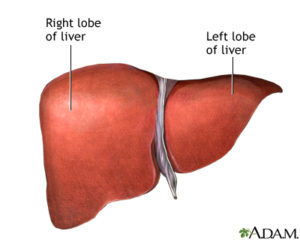Hepatitis |
||
DefinitionHepatitis is swelling and inflammation of the liver. CausesHepatitis can be caused by:
Liver disease can also be caused by inherited disorders such as cystic fibrosis or hemochromatosis, a condition that involves having too much iron in your body. Other causes include Wilson’s disease, a disorder in which the body retains too much copper. SymptomsHepatitis may start and get better quickly. It may also become a long-term condition. In some cases, hepatitis may lead to liver damage, liver failure, or even liver cancer. There are several factors that can affect how severe the condition is. . These may include the cause of the liver damage and any illnesses you have. Hepatitis A, for example, is most often short-term and does not lead to chronic liver problems. The symptoms of hepatitis include:
You may not have symptoms when first infected with hepatitis B or C. You can still develop liver failure later. If you have any risk factors for either type of hepatitis, you should be tested often. Exams and TestsYou will have a physical exam to look for:
You may have lab tests to diagnose and monitor your condition, including:
TreatmentYour health care provider will talk to you about treatment options. Treatments will vary, depending on the cause of your liver disease. You may need to eat a high-calorie diet if you are losing weight. Support GroupsThere are support groups for people with all types of hepatitis. These groups can help you learn about the latest treatments and how to cope with having the disease. Outlook (Prognosis)The outlook for hepatitis will depend on what is causing the liver damage. Possible ComplicationsComplications may include:
When to Contact a Medical ProfessionalSeek care immediately if you:
Call your health care provider if:
PreventionTalk to your provider about having a vaccine to prevent hepatitis A and hepatitis B. Steps for preventing the spread of hepatitis B and C from one person to another include:
To reduce your risk of spreading or catching hepatitis A:
ReferencesCzaja AJ. Autoimmune hepatitis. In: Feldman M, Friedman LS, Brandt LJ, eds. Sleisenger and Fordtran’s Gastrointestinal and Liver Disease. 10th ed. Philadelphia, PA: Elsevier Saunders; 2016:chap 90. Pawlotsky J-M. Chronic viral and autoimmune hepatitis. In: Goldman L, Schafer AI, eds. Goldman’s Cecil Medicine. 25th ed. Philadelphia, PA: Elsevier Saunders; 2016:chap 149. Sjogren MH, Bassett JT. Hepatitis A. In: Feldman M, Friedman LS, Brandt LJ, eds. Sleisenger and Fordtran’s Gastrointestinal and Liver Disease. 10th ed. Philadelphia, PA: Elsevier Saunders; 2016:chap 78. Sorrell MF, Belongia EA, Costa J, et al. National Institutes of Health Consensus Development Conference Statement: management of hepatitis B. Ann Intern Med. 2009;150(2):104-110. Epub 2009 Jan 5. PMID: 19124811 www.ncbi.nlm.nih.gov/pubmed/19124811. Wedemeyer H. Hepatitis C. In: Feldman M, Friedman LS, Brandt LJ, eds. Sleisenger and Fordtran’s Gastrointestinal and Liver Disease. 10th ed. Philadelphia, PA: Elsevier Saunders; 2016:chap 80. Wells JT, Perrillo R. Hepatitis B. In: Feldman M, Friedman LS, Brandt LJ, eds. Sleisenger and Fordtran’s Gastrointestinal and Liver Disease. 10th ed. Philadelphia, PA: Elsevier Saunders; 2016:chap 79. Yee HS, Chang MF, Pocha C, et al. Update on the management and treatment of hepatitis C virus infection: recommendations from the Department of Veterans Affairs Hepatitis C Resource Center Program and the National Hepatitis C Program Office. Am J Gastroenterol. 2012;107(5):669-689. PMID: 22525303 www.ncbi.nlm.nih.gov/pubmed/22525303. |


